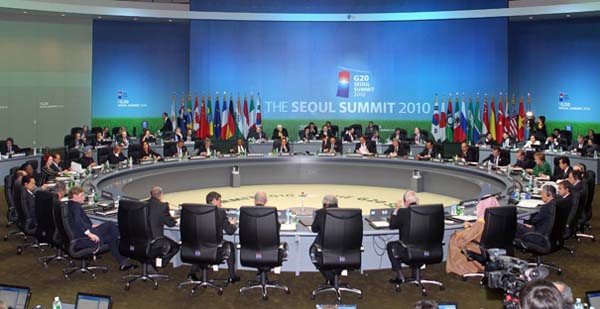G20 leaders start summit in Seoul
|
A general view shows the opening plenary session of the G20 Summit in Seoul November 12, 2010. [Xinhua] |
Leaders of the world's major developed and developing countries as well as major international institutions were gathering in the South Korean capital on Friday morning to discuss contentious issues including trade imbalances and monetary policies.
Attending the Seoul Summit were leaders from the 20 member countries, the European Union, the IMF, the World Bank, the UN, the World Trade Organization, the OECD, the African Union, the ASEAN, and the International Labor Organization, as well as from five non-G20 countries -- Ethiopia, Malawi, Singapore, Spain and Vietnam.
For each of the 24 countries, the head of State and about two financial officials were attending the summit.
Chinese President Hu Jintao attended the summit, and he was sitting between Mexican President Felipe Calderon and Canadian Prime Minister Stephen Harper at a huge roundtable.
Trade imbalances, monetary policies
At the first plenary session, South Korean President Lee Myung- bak stressed the significance of the agreements reached at the October Gyeongju G20 Finance Ministers and Central Bank Governors Meeting, which helped ease global tensions related to currency issues and trade imbalances.
He also discussed the importance of following through on the Mutual Assessment Process (MAP) to avoid future crises and promote strong sustainable growth.
G20 Seoul Summit officially started on Thursday evening when Lee Myung-bak hosted a grand welcome reception and a working dinner for leaders of the world's most important economies, including U.S., China, Germany, Japan, Russia, France, Britain and Brazil.
At the two-hour working dinner, G20 leaders began their discussion on issues related to "Global Economy and Framework", touching upon the important issues related to global imbalance and recovery.
The G20 leaders were expected to hold a total of six plenary sessions in the day.
As for the rest of the five sessions, according to the official timetable given out to the press, the meetings were scheduled to cover reform on international financial institutions, global financial safety nets, development, financial regulatory reform, anti-corruption, energy, etc.
Even during their lunch breaks, the leaders have been scheduled to talk about trade, climate change and green growth.
The leaders were expected to conclude the summit and issue a joint communique at around 04:00 p.m. local time in the day.
At the first plenary session, Lee Myung-bak said there has been "big progress" in the negotiations to narrow wide differences over how to manage trade imbalances and currencies, which paved the way for the joint communique.
Lee did not elaborate on what the progress was.
But a South Korean government source was quoted by the Yonhap news agency as saying that the negotiators came close to agreement to seek "more market-determined exchange rate systems," increase flexibility of their currencies and to create a guideline on sustainable current account imbalances by the next meeting in France.
Earlier on Friday morning, South Korea's G20 preparation committee spokesman, Kim Yoon-kyung, told reporters that G20 economies were still finalizing details on the currency and current account imbalance issues following overnight negotiations.
According to Kim, vice finance ministers and personal representatives of the leaders, dubbed the "Sherpa" group, had been trying to come to agreement, but there were still some contentious issues.
"There is considerable will among leaders to reach an understanding in Seoul," Kim said, hinting that the communique to come at the end of the two-day summit will be an improved version of the consensus reached in Gyeongju last month.
At the Gyeongju meeting, G-20 finance ministers agreed to change to some extent the global exchange system that reflected underlying economic fundamentals and to refrain from competitive devaluation of currencies.
 0
0 








Go to Forum >>0 Comments